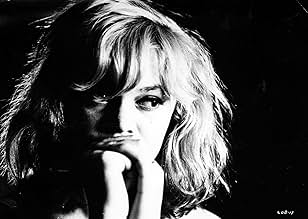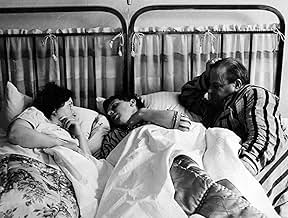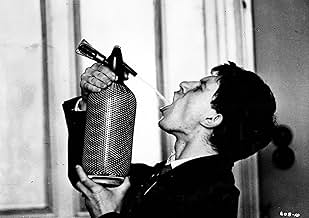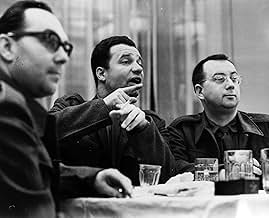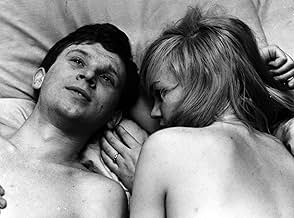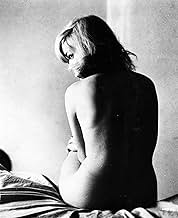IMDb RATING
7.4/10
9.9K
YOUR RATING
Factory manager gets army reserves to boost female workers' morale. Local beauty spurns them for jazz pianist who seduces her. She leaves for Prague to find him but his parents are displease... Read allFactory manager gets army reserves to boost female workers' morale. Local beauty spurns them for jazz pianist who seduces her. She leaves for Prague to find him but his parents are displeased when she arrives.Factory manager gets army reserves to boost female workers' morale. Local beauty spurns them for jazz pianist who seduces her. She leaves for Prague to find him but his parents are displeased when she arrives.
- Nominated for 1 Oscar
- 2 wins & 4 nominations total
Jana Novaková
- Jana
- (as Jana Nováková)
Jindrich Heidelberg
- Reditel
- (uncredited)
Dana Valtová
- Bohunka
- (uncredited)
Featured reviews
Milos Forman's "Loves of a Blonde" which he made in Czechoslovakia in 1965 way before "Cuckoo Nest" and "Amadeus" tells a very simple bitter-sweet tale about a teenaged girl who works in a shoe factory in a small town. With sixteen girls to one man - her chances to find a man of her dreams were not very high. One evening, she meets an attractive and young piano player who tells her about Prague and compares her to a guitar that could've been painted by Picasso. After they spend the night together, he leaves and she travels to Prague to find him. The film has been one of my favorites for many years and my opinion did not change after I saw it again a week ago - funny, sad, tender, and realistic film about searching for love, broken promises, shattered hearts, and universality of hope.
"Loves of A Blonde" is a catchy, racy title for what is actually a gentle,low-key and affectionate look at a love affair in communist Czechoslovakia in the mid-60's. The film concerns a young (yes, blonde)girl who seems to be the prettiest one working in what looks like an extremely bleak factory setting in northern Czechoslovakia. The female workers in this shoe factory seem to far outnumber the males of the town. A band travels through town to play at a weekend dance, and the titled blonde (maybe its just me, but I think she resembles Reese Witherspoon a lot at various times)takes up with the piano player. Complications ensue.
There are a number of sweetly comic moments in the film, and it has a great deal of affection for its various characters. Its not all laughs, though, as there is a melancholy undertow to all that goes on. The portrait of Czech society seems decidedly bleak...ugly towns, dreary jobs, precious little fun. The ending is rather ambiguous, but I felt it to be definitely more downbeat than upbeat. You smile, but I felt sad afterward - a feeling rather common after a youthful love affair, I suppose.
There are a number of sweetly comic moments in the film, and it has a great deal of affection for its various characters. Its not all laughs, though, as there is a melancholy undertow to all that goes on. The portrait of Czech society seems decidedly bleak...ugly towns, dreary jobs, precious little fun. The ending is rather ambiguous, but I felt it to be definitely more downbeat than upbeat. You smile, but I felt sad afterward - a feeling rather common after a youthful love affair, I suppose.
A factory manager in rural Czechoslovakia bargains with the army to send men to the area, to boost the morale of his young female workers, deprived of male company since the local boys have been conscripted.
Loves of a Blonde has often been identified as one of the most significant and ambitious productions of the Czech New Wave, a movement in which a group of young filmmakers, many of whom were educated by the national film academy in Prague, including Forman, Ján Kadár, Věra Chytilová and Jiří Menzel, among others, took significant political risks by using cinema to protest the hypocrisy and absurdity of the Communist state.
I'll say it before and I'll say it again, of all the "new wave" movements in Europe, by far my favorite is the one that came out of the Czech cinema. The beauty, the honesty and sometimes the surrealism (though not here) is just spot on, and for me really captures what it means to have film as an art form. That Forman went on to become an international success is no surprise.
Loves of a Blonde has often been identified as one of the most significant and ambitious productions of the Czech New Wave, a movement in which a group of young filmmakers, many of whom were educated by the national film academy in Prague, including Forman, Ján Kadár, Věra Chytilová and Jiří Menzel, among others, took significant political risks by using cinema to protest the hypocrisy and absurdity of the Communist state.
I'll say it before and I'll say it again, of all the "new wave" movements in Europe, by far my favorite is the one that came out of the Czech cinema. The beauty, the honesty and sometimes the surrealism (though not here) is just spot on, and for me really captures what it means to have film as an art form. That Forman went on to become an international success is no surprise.
This is the second of Forman's Czech films I've watched after the other Criterion release, THE FIREMAN'S BALL (1967) - though that was via a late-night Italian TV broadcast some years ago; these two films constitute his most celebrated work from this early phase in his career.
While a pleasant and sharply-observed comedy-drama in itself, which must have seemed fresh at the time (particularly the intimate detail of its teenage romance), I feel that a lot of these unassuming but critically-acclaimed foreign films - often made under strained political conditions - tend to come off as overrated when viewed today (a similar recent example I encountered was CLOSELY WATCHED TRAINS [1966]). That said, the film benefits immensely from the wonderful cinematography by Miroslav Ondricek (Forman's longtime collaborator).
Besides, it also includes a couple of lengthy - and delightful - set-pieces: the party sequence, in which the heroine and her two best friends are picked up by a trio of geeky middle-aged soldiers; the scene at the home of the girl's 'boyfriend' (with whom she had a one-night stand), where she causes a commotion by turning up unannounced on his doorstep with a packed suitcase!
The DVD supplements comprise an amusing but irrelevant deleted scene, and an interesting 17-minute interview with Forman - in which he discusses the film's genesis and how the mix of professional and untrained actors proved providential, sealing its essential charm.
While a pleasant and sharply-observed comedy-drama in itself, which must have seemed fresh at the time (particularly the intimate detail of its teenage romance), I feel that a lot of these unassuming but critically-acclaimed foreign films - often made under strained political conditions - tend to come off as overrated when viewed today (a similar recent example I encountered was CLOSELY WATCHED TRAINS [1966]). That said, the film benefits immensely from the wonderful cinematography by Miroslav Ondricek (Forman's longtime collaborator).
Besides, it also includes a couple of lengthy - and delightful - set-pieces: the party sequence, in which the heroine and her two best friends are picked up by a trio of geeky middle-aged soldiers; the scene at the home of the girl's 'boyfriend' (with whom she had a one-night stand), where she causes a commotion by turning up unannounced on his doorstep with a packed suitcase!
The DVD supplements comprise an amusing but irrelevant deleted scene, and an interesting 17-minute interview with Forman - in which he discusses the film's genesis and how the mix of professional and untrained actors proved providential, sealing its essential charm.
10jtur88
I don't think I've ever seen a movie that so faithfully captured the sense of place. I spent many months in the mid-60's in Czechoslovakia and Eastern Europe, and when I recently saw this film, it brought tears of nostalgia to my eyes. The scene in the parents' house, when the family was faced with the arrival of the unexpected stranger, is documentary in its portrayal of how a household would look in those times, complete to the smallest details of housekeeping and behavior. It is light-hearted without being slapstick, and it is poignant without being corny. Every character is right on the mark. On my very very short list of the greatest movies ever. In short, it is perfect. See this film, and take the whole family.
Did you know
- TriviaDirector/screenwriter Milos Forman got the idea for the movie when he met a young girl with a suitcase in the streets of Prague. Her story was very similar to the one in the film.
- ConnectionsFeatured in Fejezetek a film történetéböl: A cseh új hullám (1990)
- How long is Loves of a Blonde?Powered by Alexa
Details
- Release date
- Country of origin
- Language
- Also known as
- Loves of a Blonde
- Filming locations
- Zruc nad Sázavou, Czech Republic(formerly Czechoslovakia)
- Production companies
- See more company credits at IMDbPro
- Runtime1 hour 28 minutes
- Color
- Sound mix
- Aspect ratio
- 1.37 : 1
Contribute to this page
Suggest an edit or add missing content


